UK Urges Iran To Prevent Escalation Of Israel-Hamas Conflict
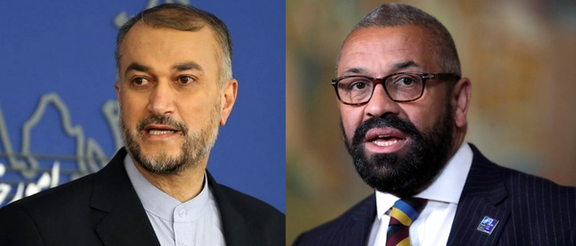
British foreign minister James Cleverly has urged Iran to use its influence with groups in the Middle East to prevent an escalation of Israel's conflict with Hamas.

British foreign minister James Cleverly has urged Iran to use its influence with groups in the Middle East to prevent an escalation of Israel's conflict with Hamas.
Britain's Foreign Office said Cleverly spoke to Iranian Foreign Minister Hossein Amir-Abdollahian on Friday, telling him "Iran bore responsibility" for the actions of groups, such as Hamas and Hezbollah, that it has supported for many years.
However, the Iranian foreign minister presented a different account of the conversation, emphasizing that he told his British counterpart that the United States cannot guarantee Israel’s victory in the ongoing Gaza war, and “it can be held responsible for spreading the flames of war that will rebound on itself.”
The Iranian regime celebrated the October 7 terror attack by Hamas and has boasted of the power of its proxy forces in the region for confronting Israel.
Cleverly also reiterated that Iranian-backed threats against people in the United Kingdom were unacceptable and must stop, a Foreign Office spokesperson said.
An investigation by The Times of London has revealed more than six UK-based groups with ties to the Iranian regime and active in pro-Hamas rallies.
It comes amid rising fears that the Iranian regime’s influence on UK soil is deepening, as seen in the weekly pro-Palestine / pro-Hamas protests which have been shown to be fuelled by Tehran-linked groups.
Last year, threats against Iran International journalist resulted in the television network temporarily relocation its broadcast operations to Washington DC.
Britain has supported Israel's right to defend itself after an Oct. 7 attack by militant group Hamas that Israel said had killed 1,400 people, mostly civilians, and saw over 200 others kidnapped.
With reporting by Reuters
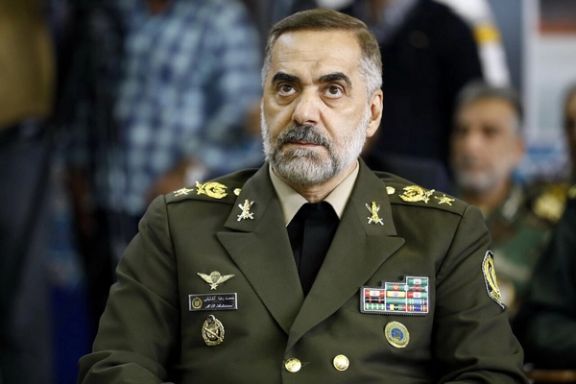
Iranian regime's Minister of Defense, Mohammad Reza Ashtiani, claimed that no country in the world is able to confront the Islamic Republic of Iran.
Apparently referring to Iran's long shoreline on the Persian Gulf and the Sea of Oman, Ashtiani claimed Iran's power derives from its strategic location.
Tensions have been rising as Iran and its ally, Hezbollah, have increased their rhetoric against Israel. However, they have refrained from opening new fronts against Israel following a strong warning from Washington.
Israel's retaliation against Hamas, which is supported by Tehran, was triggered by a terror attack last month that claimed the lives of 1,400 people and resulted in more than 200 individuals being taken hostage. Israel's response has included a retaliatory campaign, which extended to a ground offensive last week. While Hamas authorities in Gaza claim that more than 9,000 people have been killed, this figure has not been independently confirmed and may be part of the Islamist group's psychological warfare.
Regarding efforts to attribute the October 7 attack on Israel to Iran, Ashtiani stated, "The Islamic Republic of Iran is influential in the regional and global context, and the world is aware that we possess high capabilities in various fields, making us an influential country."
Israel, which Iran refuses to recognize, has long accused Iran's clerical rulers of stoking violence by supplying arms to Hamas and exerting control over the Gaza Strip, as well as supporting militants in Syria and Lebanon. Tehran maintains that it provides moral, financial, and logistical support to the groups.

The US House of Representatives has overwhelmingly approved a bill that aims to make it harder for Iran to sell its oil.
The legislation, known as the Stop Harboring Iranian Petroleum (SHIP) bill, was passed Friday with a vote of 342-69. It seeks to impose measures on foreign ports and refineries that handle petroleum exported from Iran in violation of US sanctions.
Iran's crude oil exports have been on the rise since 2021, after the Biden administration embarked on indirect negotiations with Tehran to revive the Obama-era JCPOA nuclear deal. Data from consultancies FGE and Vortexa shows that Iran's crude exports reached close to 2 million barrels a day, their highest level in over four years last month, with more than 80% of these exports going to China.
“They are using these funds to fund terrorism,” Rep. Mike Lawler said on CNN. “We need to impose stricter sanctions on the buyers of Iranian petroleum, starting with China.”
The SHIP Act is the latest in a long line of Congressional initiatives that target Iran. Any such initiative is effective only if the executive branch is willing to take it up and enforce it wholeheartedly –which doesn’t seem to be the case with the Biden administration.
Even if passed into law, many measures include national security waivers that grant presidents discretion in enforcing the law. And of course, China could ignore sanctions altogether, even if the US administration was willing to enforce them strictly.
Since 2021, Iran has increased its oil revenue by $80 billion.
Critics of President Biden say this money has been used by the IRGC to fund Hamas, Hezbollah and other militant groups in the region. Many at the Capitol blame the current government for turning away from Trump’s ‘maximum pressure’ policy on Iran.
“Biden Iran envoy Robert Malley helped directly fund and support Iranian intelligence,” wrote Rep. Ronny Jacjson on X. “At every turn, Biden has made Iran stronger, and has put our troops in harm’s way. Biden is the WORST president in history.”
In the last two weeks, US troops in Syria and Iraq have been attacked 27 times by Iran's militia proxy forces, despite repeated warnings from the administration, summarized in the now infamous phrase, “don’t” –which both President Biden and Vice President Harris have stated to be their message to the regime in Iran.
The Islamic Republic officials do not hesitate to boast about their support for militant groups in the region, most notably, Hamas in Gaza and Hezbollah in Lebanon.
So far, Hezbollah, by far the strongest of non-state actors in the Middle East, has avoided a full-scale conflict with Israel and has not attacked American forces.
Hezbollah leader Hassan Nasrallah said Friday that the Israel war on Hamas has spread to other fronts. He made no direct reference that could be read as a declaration of war on Israel, as some experts anticipated him to do.
He only claimed his group was ready for “all possibilities.”
Shortly before Nasrallah’s speech, the US Senate introduced a bipartisan bill aiming to enable the US Homeland Security Investigations (HSI) to enforce oil sanctions “to cut off Iran’s funding for its terrorist proxies.”
Senators Marco Rubio, a supporter of the bill who advocates a tougher stance against Iran, said Friday that “establishing credible deterrence risks escalation but failing to do so guarantees escalation.”
In a post on his X account, the Senator wrote, “Iran has now ordered 30 attacks on Americans. If the US does not impose a cost directly on Iran for these attacks, they will start coming faster.”
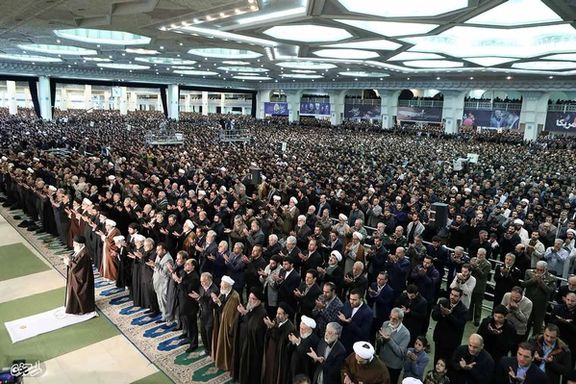
Friday Imams in Iran echoed Supreme Leader's anti-US rhetoric in their sermons in a concerted move on the anniversary of the 1979 takeover of the US Embassy in Tehran.
On November 4, 1979, pro-Khomeini Islamist and leftist students occupied the US embassy and took hostage more than 50 US diplomats for 444 days.
In their sermons, Iran's Friday Imams generally blamed the United States for the war in Gaza ignoring the fact that it was Hamas that launched the October 7 terror attack on Israel and the United States has reacted by expressing support for Israel.
In Qom, home of the country's largest Shiite seminary, Friday Imam Mohammad Saeedi claimed that "Iran has struck a hard blow against the United States with its Death to America slogan." Saeedi added: "This is not simply a slogan. It is a revolutionary strategy."
Pointing out that the Friday prayers came one day before the anniversary of the seizure of US embassy in Tehran, Saeedi said, "The takeover of the US spy den was a manifestation of this strategy."
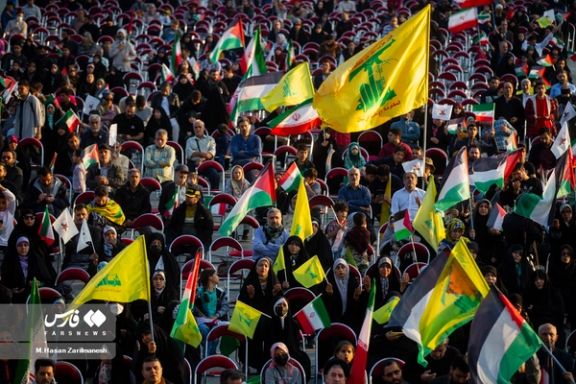
The cleric echoed Supreme Leader Ali Khamenei's criticism of the United States for supporting Israel.
In Karaj, near Tehran, Friday Imam Mohammad Mehdi Hosseini said, "The Death to America slogan ensures the Islamic Republic's authority. If it is taken away from us, we will lose our international influence." He added: "This slogan has created a strategic link between Iran and other countries and created a large front."
Hosseini further threatened, "If the Supreme Leader allows us, we will create a storm in the region." He claimed that the confrontation during the past 40 years between Iran on the one hand, and Israel and the United States on the other is an outcome of the Islamic Republic of Iran's influence, power and strategic depth.
He stated that the current war in Gaza is not about Israel and Palestinians, it is a war between what is right and what is wrong.
The Friday Imam of Isfahan, Mojtaba Miordamadi expressed hope in his sermon that "The United States will be destroyed soon." He also included Israel in his hate speech saying, "I hope the America and criminal Israel are going to be destroyed soon, and God gives us the good news about the annihilation of the Zionist regime."
Referring to Khamenei's statement on Thursday that "Israel would have not been able to resist against Palestinians for even one week if it weren't for the US military support," Mirdamadi said, "Israel has been weakened and its death is approaching despite the arrogant world's support."
In Mashhad, firebrand cleric Ahmad Alamolhoda said the United States is so unclean that it is “not to be touched” and added, "The United States is the filthiest point in the world. It is hated by the whole world and no one sees any value in it."
Alamolhoda added, "None of the Islamic governments in the region dares to normalize their ties with America anymore." In one of his most elaborate anti-Semitic comments, he claimed that "Jewish people do not believe in God's power." He further stated, "It is part of Israel and the United States' philosophy that human beings should only think of their own desires." He added, "Zionism inspired United States imperialism and its world-devouring nature."
Alamolhoda utterly distorted Iran's modern history, saying, "It was the United States that sent Ruhollah Khomeini, the founder of the Islamic Republic, into exile in 1964." He continued his fabricated version of history by claiming, "The United States attacked Iranian students with machine guns on November 4, 1979, and then fled Iran." Iranian "students" on that date occupied the US Embassy in Tehran and took 54 US diplomats hostage for 444 days while calling on the US not to offer medical treatment to Shah Mohammad Reza Pahlavi, who was in a New York hospital with terminal cancer.
He further threatened that the United States should be held accountable for Israel's violence in Gaza.
However, the anti-US rhetoric in Iran ahead of the anniversary of the occupation of the US Embassy was not limited to clerics. Hossein Salami, the commander of the revolutionary guards (IRGC) also spoke against the US during a meeting with clerics and Basij militia and said: "The world is more united than ever against America and its policies."
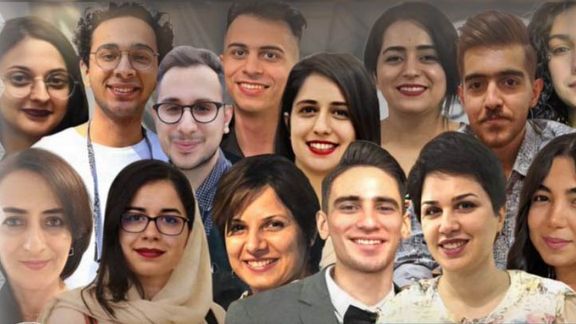
The Court of Appeals in northern Mazandaran province has sentenced 14 Baha’i citizens to imprisonment and fines.
According to the HRANA human rights news agency, Sanaz Hekmat Shoar and Bita Haghighi, two Baha’i citizens, were each sentenced to three years in prison and additional fines.
The news agency also announced that twelve other defendants in this case, named Mani Ghoi-Nejad, Negar Darabi, Sam Samimi, Mahsa Fathi, Samieh Gholi-Nejad, Majir Samimi, Anis Sanaei, Afsnaneh Nematian, Basir Samimi, Hengameh Alipour, Golin Falah, and Nazanin Goli were sentenced to a fifty-million-toman fine (approximately 1,000 dollars) in exchange for the initial sentence of two years and one month.
These Baha’i citizens were arrested in August 2022 in Mazandaran province but were released on bail months after.
At the time of their arrest, the Ministry of Intelligence released a statement, accusing these citizens of being members of an espionage organization and claiming that two of them had received training from Israel.
According to HRANA annual report, from the total human rights reports regarding the violation of religious minorities’ rights, 64.63% belonged to the violation of the rights of Baha’is.
The Baha’i faith is not recognized as a legitimate religion by Iranian authorities, leading to systematic and longstanding violations of the rights of Baha’is in the country.
Approximately 300,000 Baha'is reside in Iran, and they frequently document a pattern of regular rights violations. The violations encompass harassment, forced displacement from their residences and businesses, and unequal treatment regarding government employment and access to higher education.
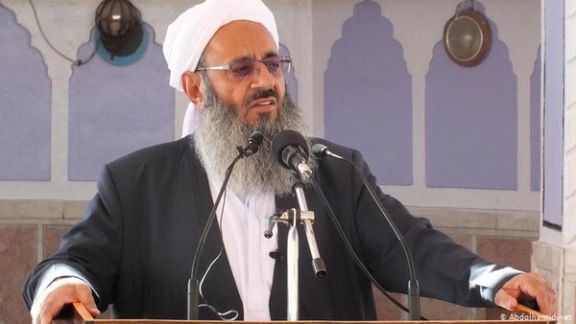
Iran’s top Sunni cleric Mowlavi Abdolhamid called for “justice” during his weekly sermons referring to a massacre which took place in the city of Khash last year.
According to Amnesty International, during the "Bloody Friday of Khash" in November 2022, the Islamic Republic forces shot live ammunition at protesters and worshippers, killing at least 18 people, including two children, and injuring dozens.
In his remarks on Friday, Abdolhamid expressed the Iranian people's demand for "justice" and the punishment of the culprits behind the massacre. The incident occurred a few weeks after a similar attack by security forces in the provincial capital Zahedan, where about 100 protesters were killed by the regime’s security forces.
Human rights media outlet Haalvsh has also reported the presence of military forces and intense security measures around Zahedan's Makki Mosque and the city of Khash.
Abdolhamid emphasized the importance of justice and freedom in Iran in his Friday sermon. He stated that existing discrimination and inequalities must be addressed, and political prisoners, including writers, journalists, and intellectuals, should be released and criticism should be tolerated.
After the bloody attacks on protesters in Zahedan and Khash, various cities in Sistan and Baluchestan province have been scenes of popular demonstrations every Friday over the past year.
Despite increased pressure, the protests have continued with authorities blocking the internet and access to communication in the province. Rights groups say, the internet has been shut down continuously since the widespread anti-government protests began in September 2022.